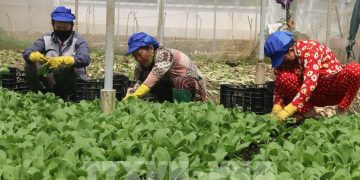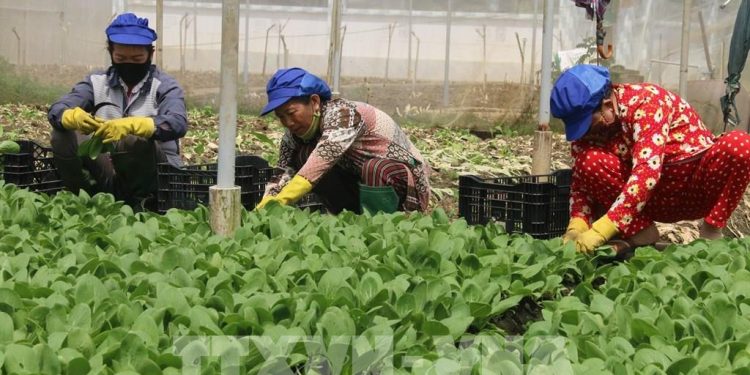#Agriculture #ClimateAdaptation #SustainableFarming #VietnamAgriculture #VegetableCultivation #FarmersSuccess #CooperativeFarming #ClimateResilience
In the picturesque province of Tiền Giang, Vietnam, the agricultural sector is witnessing a colorful revolution. According to Nguyen Van Man, the Director of the Department of Agriculture and Rural Development, the province achieved a remarkable milestone in 2023, cultivating over 54,000 hectares of high-quality vegetables. The harvest yielded an impressive 1.186 million tons of various vegetables, meeting the demands of both local and external markets.
The province’s strategic focus on optimizing the potential of vegetable crops has led to a shift in cultivation patterns. In areas traditionally less efficient for rice farming, such as riverbanks, coastal regions, and the Mekong Delta, farmers are encouraged to convert unproductive rice fields into lucrative vegetable plots. This move not only enhances economic returns but also establishes sustainable farming practices, aiding communities in maintaining stable production and livelihoods amidst climate change.
Noteworthy expansions include nearly 6,000 hectares of vegetable cultivation on the foot of rice fields, strategically concentrated in flood-prone areas west of the province and the Mekong Delta region.
In Tan Phuoc district, situated in the Mekong Delta, farmers triumphed over previously infertile, saline-ridden rice fields by successfully cultivating over 1,500 hectares of vegetables in 2023. The yield surpassed annual targets, with approximately 31,000 tons of produce, including 360 hectares dedicated to watermelon production, contributing significantly to the province’s agricultural landscape.
Tan Phuoc has emerged as a key region for watermelon cultivation in Tiền Giang, with its produce widely consumed both within and beyond the province, providing farmers with a substantial source of income.
The coastal villages of Go Cong Dong, namely Tan Dien, Tan Thanh, Kieng Phuoc, and Gia Thuan, exemplify another success story. Here, around 150 hectares of land, usually susceptible to salinity during dry seasons, have been transformed into thriving fields of various vegetables, including onions, chives, watermelons, bitter melons, cucumbers, and leafy greens. This initiative not only ensures economic sustainability but also mitigates the impact of natural disasters.
In Go Cong Tay district, the eastern part of the sweetening Go Cong region, efforts are directed towards breaking the monoculture of rice by actively promoting vegetable cultivation. Embracing intercropping and diversified agricultural models, the district aims to adapt to climate change while fostering sustainable agricultural development.
Le Van Ne, Deputy Chairman of the People’s Committee of Go Cong Tay, highlights the strategic planning of concentrated vegetable cultivation areas, emphasizing collective economic development and encouraging value chain linkages to ensure market access and stable incomes for farmers.
Presently, Go Cong Tay has successfully established six cooperative associations specializing in vegetable farming. These cooperatives, such as Thanh Hung, Phu Quoi, Hoa Thanh, Binh Nhut, Long Binh, and Long Thoi Thinh, benefit from supportive policies that facilitate collaboration, ensuring a stable market for the produce.
To further enhance farmers’ income, the district has implemented projects supporting three production-consumption linkage plans involving 115 households cultivating nearly 32 hectares. Through these initiatives, farmers enjoy secure markets and stable prices, resulting in increased confidence and productivity.
Le Van Ne assesses the profitability of vegetable farming at approximately 395 million VND per hectare, significantly surpassing the returns from monoculture rice farming.
Pham Van Chinh, a farmer in Thanh Cuu Nghia commune, Chau Thanh district, reflects on his success in vegetable cultivation. By adapting to climate change and transitioning from rice to vegetables, he has not only overcome adversity but has also built a sustainable livelihood. Chinh shares his experience of reaping profits ranging from 8 to 10 cycles per year, yielding a net income of about 200 million VND annually.
Nguyen Van Man, the Director of the Department of Agriculture and Rural Development, underscores the overall superior profitability of vegetable cultivation in adapted production models compared to traditional rice monoculture. The success is attributed to rational seasonal regulation, the adoption of scientific and technical advancements, and the development of collaborative production models that address market demands and benefit farmers.
Tiền Giang province’s embrace of vibrant vegetable cultivation serves as a beacon of agricultural innovation, demonstrating the resilience of farmers in adapting to changing climates and creating sustainable livelihoods. The success stories from Tan Phuoc, Go Cong Dong, and Go Cong Tay exemplify the transformative power of strategic planning, cooperative efforts, and embracing diversified agricultural models.































